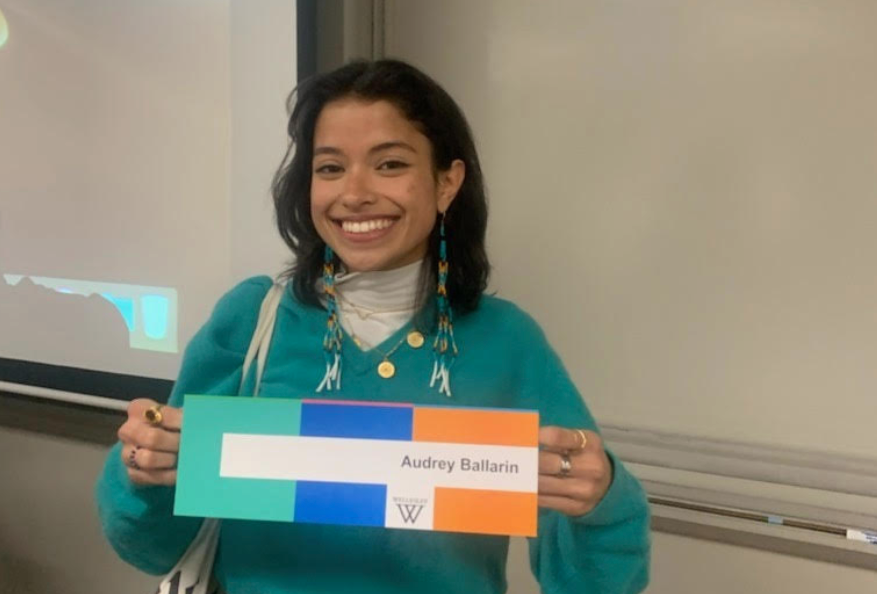This year on Nov. 15, over 200 students presented a diverse array of topics at the annual Tanner Conference, exploring their work and experiences during the summer months and beyond. The Tanner Conference is an opportunity for the Wellesley community to celebrate and learn about students’ exploration outside of the classroom.
Audrey Ballarin ’23, who presented at this year’s conference, spent the summer working on a virtual reality reconstruction of Ancient Eleon in modern day Greece, a project that is co-directed by Wellesley Professor of Classical Studies Bryan Burns. Ballarin, who is a computer science major, said that she chose to present because of her somewhat atypical experience at her summer internship.
“It actually informed my computer science interests … I wanted to communicate to people that they can choose unconventional experiences even if they’re heading towards a very conventional academic path. I wanted to let people know that there are lots of cool options. I don’t want people to shy away from interdisciplinary work because it’s less traditional,” Ballarin said.
When putting her Tanner presentation together, Ballarin said she decided to distill the information she wanted to share into two components. The first was an overview of her work scanning the tombs and the artifacts in them using photogrammetry and laser scanning. Ballarin explained that she used photogrammetry to take 2D images of the site and reproduce them as 3D models, and worked with laser scanning to produce 3D models of artifacts and bones. The second component of Ballarin’s presentation was a reflection on her work, and its implications, which was informed by her experiences and conversations with locals.
“I wanted to talk about the personal impact that it had. One of the big things that I got from looking at an archeological site was thinking very deeply about archeological ethics because this is a gravesite. I was working with human remains, so I definitely wanted to touch on that,” Ballarin said.
Ballarin also mentioned her funding for the project and how she obtained it, in the hopes of highlighting how students with greater financial need are still able to participate in these programs.
“The way that I was able to afford all the travel and housing expenses in Greece was through the Gilman Scholarship, which is a study abroad scholarship that you are eligible for if you’re a US citizen and a Pell Grant recipient,” Ballarin said. “I wanted to communicate to people … that they should apply for funding, any kind of funding, if it’s there.”
Eshika Kaul ’23, also noted the opportunity to broadcast alternative learning experiences as one of her main reasons for choosing to create a Tanner.
“I wanted to create a panel of students who were economics majors who essentially were in … internships all the way from the public sector to the private sector. I think we often see one or the other, not both … It was primarily because a lot of the opportunities that my friends and I had I [wouldn’t] have known about when I entered Wellesley, and it was really important for me to be able to support Wellesley students in figuring out the different opportunities and options there are,” Kaul said.
Kaul was one of five students presenting in her panel and spoke of her summer interning at Bates White Economic Counseling. Kaul explained that coming into Wellesley, she had an interest in both economics and the legal system but did not know if they could fit together.
“I always felt like I would have to pick one or the other, but then I found economic consulting, which … was a really beautiful intersection of economics and law,” Kaul said. “It was cool to see the role of private firms and private litigation in the legal system … and how we do need these types of litigation in order for our system to continue doing what it’s doing.”
Kaul said that although she “really love[s] talking about Bates White” and has spoken with peers about it before, some parts of creating her Tanner were a bit more difficult.
“The easiest part of creating a Tanner is the work that you did … you’re an expert,” Kaul said. “What I … find to be [one] some of the harder parts is really coming up with … a unique takeaway.”
Avalon Swanson ’23, a history and Japanese double major, shared takeaways from her summer interning for the US Securities and Exchange Commission (SEC).
“I worked in the press division of the SEC … on advertising the efforts of what they do and learning how to articulate complex financial concepts into normal English, and in some respects my Tanner was just an extension of what I had done all summer,” Swanson said.
After a summer spent learning about the regulation of financial markets, Swanson also decided to share her observations of the financial field as a whole.
“I think that these large financial institutions use … [complex] terminology to make … people not in the field feel lesser than … It’s important for people to have a baseline financial literacy even if they don’t want to go into the field,” Swanson said.
For students attending the Tanner Conference, Swanson said that the polished presentations are the culmination of lots of trial and error and that there is no best path, or internship, to choose.
“You see these people who have all these amazing experiences, but keep in mind that these people have [taken] multiple years to build up to this point, and where you start isn’t where you end up,” Swanson said. “It’s really important to be flexible, to accept opportunities that you may not love but you could get something out of, because utilizing those opportunities can really enable you to get to where you want to be.”






